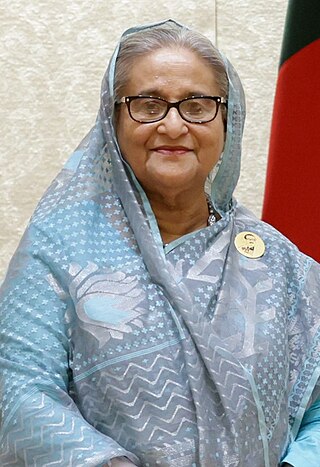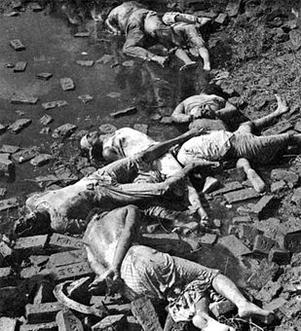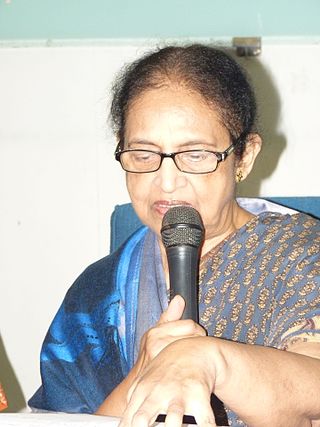Related Research Articles

Bangladesh, officially the People's Republic of Bangladesh, is a country in South Asia. It is the eighth most populous country in the world and is among the most densely populated countries, with a population of around 170 million in an area of 148,460 square kilometres (57,320 sq mi). Bangladesh shares land borders with India to the west, north, and east, and Myanmar to the southeast; to the south it has a coastline along the Bay of Bengal. It is narrowly separated from Bhutan and Nepal by the Siliguri Corridor; and from China by the Indian state of Sikkim in the north. Dhaka, the capital and largest city, is the nation's political, financial and cultural centre. Chittagong, the second-largest city, is the busiest port on the Bay of Bengal. The official language is Bengali.

Dhaka, formerly known as Dacca, is the capital and largest city of Bangladesh. It is the ninth-largest and seventh-most densely populated city in the world. Dhaka is a megacity, and has a population of 10.2 million residents as of 2022, and a population of over 22.4 million residents in Dhaka Metropolitan Area. It is widely considered to be the most densely populated built-up urban area in the world. Dhaka is the most important cultural, economic, and scientific hub of Eastern South Asia, as well as a major Muslim-majority city. Dhaka ranks third in South Asia and 39th in the world in terms of GDP. Lying on the Ganges Delta, it is bounded by the Buriganga, Turag, Dhaleshwari and Shitalakshya rivers. Dhaka is also the largest Bengali-speaking city in the world.

The Bangladesh Armed Forces are the combined military forces of the People's Republic of Bangladesh. It consists of the three uniformed military services: the Bangladesh Army, the Bangladesh Navy and the Bangladesh Air Force. The Armed Forces are under the jurisdiction of Ministry of Defence of the Government of Bangladesh, and is directly administered by the Armed Forces Division of the Prime Minister's Office. The President of Bangladesh serves as the Commander-in-Chief of the Bangladesh Armed Forces. It has the third-largest defence budget in South Asia and according to the Global Firepower index it is the third most powerful military force in South Asia. Border Guard Bangladesh and Bangladesh Coast Guard are under the jurisdiction of the Ministry of Home Affairs during peacetime, but during wartime they fall under the command of Bangladesh Army and Bangladesh Navy respectively.

Khaleda Zia is a Bangladeshi politician who served as the prime minister of Bangladesh from March 1991 to March 1996, and again from June 2001 to October 2006. She was the first female prime minister of Bangladesh and second female prime minister in the Muslim world, after Benazir Bhutto. She is the widow of former president of Bangladesh Ziaur Rahman. She is the chairperson and leader of the Bangladesh Nationalist Party (BNP) since 1984, which was founded by her late husband in 1978.

Sheikh Hasina Wazed is a Bangladeshi politician who has served as the tenth Prime Minister of Bangladesh since January 2009. Hasina was among Time's 100 most influential people in the world in 2018.
Abdur Rahman Biswas was a Bangladeshi politician. He was the President of Bangladesh from 1991 to 1996. Biswas represented Pakistan at the United Nations General Assembly prior to the independence of Bangladesh.

Rapid Action Battalion or RAB, is an anti-crime and anti-terrorism unit of the Bangladesh Police. This elite force consists of members of the Bangladesh Army, Bangladesh Police, Bangladesh Navy, Bangladesh Air Force, Border Guard Bangladesh, and Bangladesh Ansar. It was formed on 26 March 2004 as RAT, and commenced operations on 14 April 2004.

The Bangladesh genocide, known as the Gonohotta, began on 25 March 1971 with the launch of Operation Searchlight, as the government of Pakistan, dominated by West Pakistan, began a military crackdown on East Pakistan to suppress Bengali calls for self-determination. During the nine-month-long Bangladesh Liberation War, members of the Pakistan Armed Forces and supporting pro-Pakistani Islamist militias from Jamaat-e-Islami killed between 300,000 and 3,000,000 people and raped between 200,000 and 400,000 Bengali women, in a systematic campaign of genocidal rape. The Government of Bangladesh states 3,000,000 people were killed during the genocide, making it the largest genocide since the Holocaust during World War II.

Human rights in Bangladesh are enshrined as fundamental rights in Part III of the Constitution of Bangladesh. However, constitutional and legal experts believe many of the country's laws require reform to enforce fundamental rights and reflect democratic values of the 21st century.

Rounaq Jahan is a Bangladeshi political scientist, feminist leader and author. A former faculty of the University of Dhaka, Jahan teaches and researches at the Columbia University since 1990. She was a representative of Bangladesh to the 32nd Session of the United Nations General Assembly in 1977. She founded Women for Women, one of the first feminist research centres in Bangladesh, in 1973, and is the director of Research Initiatives Bangladesh (RIB).

The Bangladesh Chhatra League, formerly known as the East Pakistan Student League, often simply called the Chhatra League, is a students' political organisation in Bangladesh, founded by Sheikh Mujibur Rahman on 4 January 1948. BSL is the student wing of the Bangladesh Awami League.

The University of Dhaka is a public research university located in Shahbag in Dhaka, Bangladesh. It was established in 1921 as University of Dacca and it is the oldest active university in Bangladesh.
Suicide in Bangladesh is a common cause of unnatural death and a long term social issue. Of all the people reported dead due to suicide worldwide every year, 2.06% are Bangladeshi.

Hefazat-e-Islam Bangladesh is a far-right conservative-islamic advocacy group consisted mostly of hard-line religious teachers and students. In 2013, they submitted a 13-point charter to the Government of Bangladesh, which included the demand for the enactment of a blasphemy law.

Enforced disappearances in Bangladesh are cases in which the Government of Bangladesh directly or indirectly kidnaps people and holds them incommunicado. According to a Dhaka-based human rights group Odhikar, at least 402 people have become victim of enforced disappearance from 2009 to 2017 under the current Awami League administration. These incidents along with extrajudicial killings in Bangladesh has been criticized by The United Nations and human rights groups including Human Rights Watch and Amnesty International. Rapid Action Battalion (RAB), a special paramilitary unit in Bangladesh, is alleged to be behind most of these disappearances even though RAB claimed these allegations to be false. The current Awami League government denies involvement in these forced disappearances even when victims later surface in custody.
Feminism in Bangladesh seeks equal rights of women in Bangladesh through social and political change. Article 28 of Bangladesh constitution states that "Women shall have equal rights with men in all spheres of the State and of public life".

Najma Chowdhury was a Bangladeshi academic. She was a pioneer in establishing women studies in Bangladesh. She founded the Women and Gender Studies department of the University of Dhaka in 2000. She was an advisor to the first caretaker government in 1996. She was awarded the Ekushey Padak, Bangladesh's second highest civilian honour, for research in 2008.

The Bangladesh Secretariat, also known as Bangladesh Sachibalaya or Old Secretariat, is the administrative headquarters of the Government of Bangladesh, and houses the majority of ministries and government agencies and bodies. The secretariat can refer to the complex of ministries, or refer to the Bangladesh Civil Service central administration. Its political heads are the ministers while the administrative heads are the Secretaries to the Government. It is located in Bangladesh's capital city of Dhaka in the neighbourhood of Segunbagicha in the thana of Shahbagh. The Secretariat complex was originally constructed as Secretariat of East Pakistan.
Bina D'Costa is an Australian-Bangladeshi academic who specializes in conflict and gender studies in South Asia.
Krishna Pada Roy is a Deputy Inspector General of Bangladesh Police Officer and commissioner of Chattogram Metropolitan Police. He is a former additional commissioner of Dhaka Metropolitan Police.
References
- ↑ "Gender-neutral mass media underscored". The Daily Star. 24 May 2012. Retrieved 12 October 2017.
- ↑ "List of Officers (Not in order of seniority)". Department of Women Affairs. Retrieved 1 May 2020.
- ↑ "History of DWA". Department of Women Affairs. Retrieved 12 October 2017.
- ↑ "Five Dhaka division women awarded for their feats". The Daily Star. 17 February 2014. Retrieved 12 October 2017.
- ↑ "Helpline for women, children opens". The Daily Star. 20 June 2012. Retrieved 12 October 2017.
- ↑ "'Violence leaves psychological scars in women'". The Daily Star. 10 August 2009. Retrieved 12 October 2017.
- ↑ "Where babies safe without mothers". The Daily Star. 7 November 2015. Retrieved 12 October 2017.